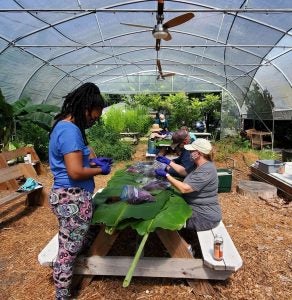According to North Carolina State University’s research on community gardens’ holistic effects on communities (predominantly urban communities), participation in community gardens by those in a community can be an effective tool for community-based leaders to carry out their organizing, development, and change.
Well, by all means. Let’s wield Black-owned community gardens to cultivate change in our communities. And here is why.
If more people supported Black-owned community gardens, not only are we supporting ourselves through growing and learning about our food, but we are supporting the closure of the racial wealth gap for Black owned-farms through our physical involvement and fiscal support.
In the same way farmers markets connect the community to the people who grow our food, Black-owned community gardens have the opportunity to expose communities to everything a community garden is meant to expose us to: healthy eating habits, how to grow our own food, experiences in the industry, a place to relieve stress. What sets Black-owned community gardens apart is that they can also be a place to learn about each other’s cultures and what makes each of us so unique.
The more opportunities we can get to be exposed to one another’s transgressions, stories, interests, and cultures, the more likely we are to find common ground. What a better place to do so than in the soil, trowel in hand, conversing with a local community garden member over this season’s crop.
To begin our exploration of Black-owned community gardens, here are four Black-owned community gardens across the nation that we can get involved with today:
1. Rid-All Green Partnership
View this post on Instagram
Years ago, three childhood friends from the same neighborhood had made their ambitions of beginning a community supporting garden a reality. The birth of Rid-All Green Partnership.
Rid-All Green Partnership’s mission is simple: to transform communities. Black-owned and operated, Rid-All is housed in Cleveland, Ohio’s Kinsman Neighborhood, where they grow a variety of produce, fish, and create soil through composting. Their composting practices are exceptionally successful, garnering donations from local food banks and businesses as the ingredients to their “black gold” compost.
Rid-All is also passionate about educating the community on agriculture, opening their farm to touring schools, local leaders, and everyday citizens. Along with tours, Rid-All also has created a comic book series called Brink City: Green in the Ghetto — their main goal is to prevent community violence and promote the agricultural industry. Rid-All also gives back to their community, providing adults and young people the opportunity to volunteer on their farm and work on their many fish, soil, and produce related projects.
Visit their website to see how you, your family, and/or your community can get involved today with Rid-All Green Partnership.
2. Fresh Future Farm

Fresh Future Farm realizes the barriers facing urban communities. From disinvestment in communities that spur a lack of traditional grocery stores and quality jobs to having the highest eviction rates in the U.S, Fresh Future Farm invests in their community of North Charleston, South Carolina, by providing affordable groceries and jobs at livable wages through their community farm.
“By employing our neighbors to build and operate transformational urban farms and grocery stores, we are improving wellness and livelihoods at the ground level,” the farm says.
If you would like to join their mission of supporting their community, volunteer at their farm. There is a limited amount of space, and volunteer opportunities are on Thursdays and Saturdays from 7:30 to 10 a.m. You can volunteer at the farm, the farm store, and/or anything they need to keep the farm operational.
If you would like to join their mission to support communities right where you are, Fresh Future Farm will help you start your own urban farm in your community. With a one-time fee of $30,000, they will provide you access to Fresh Future Farm development blueprints, access materials to build and engage the community, and support from the original Fresh Future Farm lead team as you grow your farm.
For more details on Fresh Future Farm and help in creating your own urban farm, visit their website.
3. Fountain Heights Farms
View this post on Instagram
Founded by M. Dominique Villanueva and Christopher Gooden, Fountain Heights Farms was established to improve the quality of life for the current residents of Fountain Heights historical community of Birmingham, Alabama.
Since beginning their community garden in 2017, Fountain Heights Farms has used culturally appropriate urban farming practices to grow and distribute more than 10,800 pounds of food. They, like the Black-owned community gardens shared previously, provide neighborhood employment opportunities and host multiple virtual/in-person workshops to train and cultivate relationships with each of the community members interested.
To summarize their approach, they not only want to provide healthy foods through urban farming initiatives, but they care deeply about cultural inclusivity and education that reconnects urban folks to the joys of nature. They also desire to advocate for BIPOC land ownership, land retention, and land justice.
To learn more about their mission and vision, visit Fountain Heights Farms website.
4. Soul Fire Farm
View this post on Instagram
As shared in their mission statement, Soul Fire Farm is an Afro-Indigenous centered community farm “committed to uprooting racism and seeding sovereignty in the food system”.
Soul Fire Farms is more than a community garden/farm, it’s an educational environment. Soul Fire Farm teaches practices to urban folks on how to grow their own food and delivers farm grown produce to the steps of community members. However, they are also change agents seeking to educate the community around food apartheid, land return initiatives, and creating educated decision makers who are versed in the interworkings of systems and policy.
“We are training the next generation of activist farmers and strengthening the movements for food sovereignty and community self-determination.”
To join their movement and learn more about their farm, visit Soul Fire Farms website.
Interested in more?
Check out Caroline Biggs’ column on the Martha Stewart Website. It features more Black-owned farms and Black-owned community gardens around the United States.
Bre Holbert is a past National FFA President and studies agriculture science and education at California State-Chico. “Two ears to listen is better than one mouth to speak. Two ears allow us to affirm more people, rather than letting our mouth loose to damage people’s story by speaking on behalf of others.”



